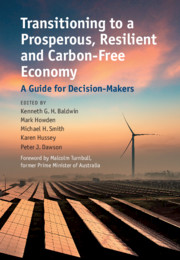Book contents
- Transitioning to a Prosperous, Resilient and Carbon-Free Economy
- Transitioning to a Prosperous, Resilient and Carbon-Free Economy
- Copyright page
- Dedication
- Contents
- Figures
- Tables
- Contributors
- Foreword
- Introduction
- 1 Policy Frameworks and Institutions for Decarbonisation: The Energy Sector as ‘Litmus Test’
- Technologies for Decarbonising the Electricity Sector
- Example Economies
- Cities and Industry
- Land Use, Forests and Agriculture
- Mining, Metals, Oil and Gas
- Addressing Barriers io Change
- 21 Trade and Climate Change
- 22 Improving the Governance of Governments
- 23 Financing the Transition
- 24 Social Movements for Change
- Index
- References
21 - Trade and Climate Change
from Addressing Barriers io Change
Published online by Cambridge University Press: 08 October 2021
- Transitioning to a Prosperous, Resilient and Carbon-Free Economy
- Transitioning to a Prosperous, Resilient and Carbon-Free Economy
- Copyright page
- Dedication
- Contents
- Figures
- Tables
- Contributors
- Foreword
- Introduction
- 1 Policy Frameworks and Institutions for Decarbonisation: The Energy Sector as ‘Litmus Test’
- Technologies for Decarbonising the Electricity Sector
- Example Economies
- Cities and Industry
- Land Use, Forests and Agriculture
- Mining, Metals, Oil and Gas
- Addressing Barriers io Change
- 21 Trade and Climate Change
- 22 Improving the Governance of Governments
- 23 Financing the Transition
- 24 Social Movements for Change
- Index
- References
Summary
Concerns about international competitiveness and the associated global institutions and processes of trade are at the heart of resistance to ambitious climate policy. There is tension between the need to be competitive and the significant costs of decarbonisation in the transition to low-carbon economies. The World Trade Organisation and related agreements simultaneously promote contradictory goals: the removal of 'barriers to trade' including 'behind the border' environmental regulation and the need to support 'sustainable development'. A particular example of the problems for action on climate change are Investor-State Dispute Settlement (ISDS) provisions whereby corporations have been able to sue governments for damages allegedly incurred through the operation of government environmental regulations. Five actions are suggested: raising awareness of the benefits of decarbonisation, developing 'green finance', pursuing standardisation of low carbon technologies, reforming trade law to encourage low-carbon goods and services and ensuring copherence across international frameworks.
Keywords
- Type
- Chapter
- Information
- Transitioning to a Prosperous, Resilient and Carbon-Free EconomyA Guide for Decision-Makers, pp. 571 - 590Publisher: Cambridge University PressPrint publication year: 2021
References
- 1
- Cited by

